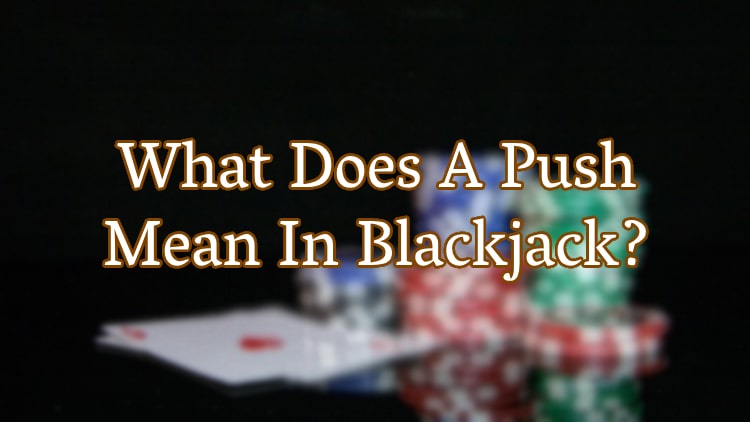
In the bustling casinos of the UK, from the glittering establishments in London, to the vibrant gaming floors in Manchester, Blackjack holds a place of honour among card games. Its allure lies not just in the simplicity of its aim— trying to beat the dealer to 21 without going over—but also in the subtle complexities and terms such as "push" that can sometimes perplex newcomers. Understanding what a push entails is essential for anyone looking to navigate the Blackjack tables with confidence.
A push in Blackjack occurs when the final total of your hand is identical to that of the dealer's. This standoff means neither party wins or loses. Instead, the bet you placed remains intact, neither forfeited to the dealer, nor doubled as a win. For many, a push can feel like a missed opportunity, especially if playing with a strong hand, but it also serves as a second chance, a lifeline when faced with potential defeat.
The occurrence of a push adds a layer of strategy to Blackjack. It introduces a scenario where risk and potential reward must be carefully balanced, where the decision to hit or stand becomes even more critical. In UK casinos, the rules surrounding pushes are consistent, ensuring that all players, regardless of experience level, stand on equal footing. This fairness is part of what makes Blackjack so appealing, a game where skill and chance meet in equal measure.
How Does Push In Blackjack Work?
The mechanics of a push in Blackjack are straightforward, yet they play a significant role in the flow of the game. When you and the dealer end the round with matching hand totals, the dealer will announce a push. Your chips remain untouched in the betting box, a symbol of the stalemate between you and the house. The next round begins, and you have the option to leave your bet as is or adjust it, depending on your strategy.
This scenario underscores the importance of understanding Blackjack's basic strategy. Knowing when to hit, stand, double down, or split can dramatically influence the likelihood of a push. For example, if you're cautious with a hand total of 12 against a dealer showing a 4, you might opt to stand, hoping the dealer busts. However, this conservative play increases the chances of a potential push, as the dealer has a significant chance of ending with a low total as well.
The concept of a push extends beyond just the player and dealer's hands. In some variations of Blackjack found in UK casinos, certain side bets can offer push outcomes, adding another dimension to the game's strategy. These nuances make Blackjack both fascinating and slightly daunting for newcomers. Yet, with time and experience, players learn to navigate these waters.
Why Is 22 Always Considered a Push In Blackjack?
A common misconception among many Blackjack novices is the idea that a total of 22 automatically results in a push. This rule is not a standard aspect of traditional Blackjack, but rather a specific variation known as Blackjack Switch. In this version, players are dealt two hands and have the option to switch the second cards dealt to each hand. The trade-off for this advantage is that if the dealer ends up with a total of 22, it's considered a push against any player hands that haven't already busted or hit Blackjack.
This twist on the classic game introduces a unique strategic element. Players must weigh the benefits of switching cards against the potential of a dealer push with a 22. It's a gamble, a deviation from the traditional rules that can potentially lead to both frustration and exhilaration. This rule modification underscores the diversity of Blackjack games available in UK casinos, each offering a different experience and set of challenges.
Understanding the specific rules of the Blackjack variant you're playing is crucial. While the 22 push rule is specific to Blackjack Switch, other variations have their own twists and turns. Familiarising yourself with these rules before sitting down to play can significantly impact your decision-making process and overall strategy, enhancing your enjoyment of the game and your chances of success.
How Much Is a King Worth In Blackjack?
In the realm of Blackjack, the value of cards is both simple and foundational to the game's strategy. Face cards—Kings, Queens, and Jacks—each hold a value of 10. This uniformity among the face cards simplifies the process of calculating hand totals, making the game more accessible to beginners while still maintaining depth for experienced strategists.
The King, with its value of 10, plays a pivotal role in potentially forming strong hands. Paired with an Ace, which can be worth either 1 or 11, the King can help achieve a Blackjack, the coveted 21 that gives the game its name. This combination of an Ace and a face card is a powerful one, offering the highest possible hand total without the risk of busting.
In conclusion, the push in Blackjack represents a fascinating aspect of the game, a moment of equilibrium in the ongoing battle against the dealer. Understanding how pushes work, the specific scenarios like the 22 push rule in Blackjack Switch, and the value of cards such as the King, can enrich your gameplay experience. Whether you're a seasoned player or a newcomer to the Blackjack tables in the UK, appreciating these details can transform your approach to the game, making each hand a narrative of strategy, risk, and chance.
*All values (Bet Levels, Maximum Wins etc.) mentioned in relation to these games are subject to change at any time. Game features mentioned may not be available in some jurisdictions.
